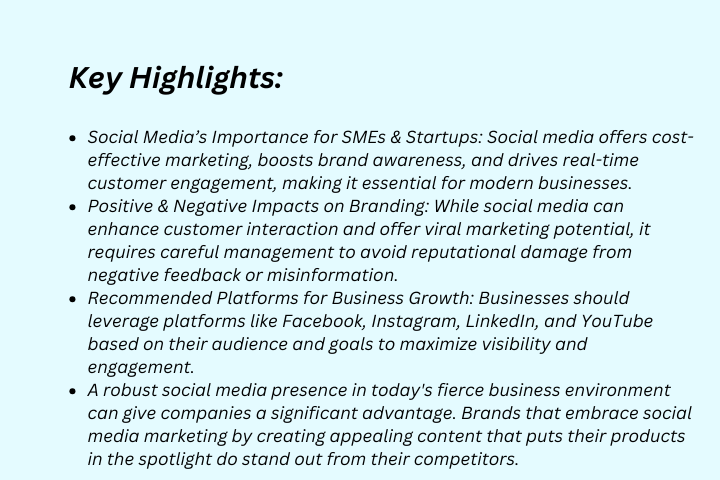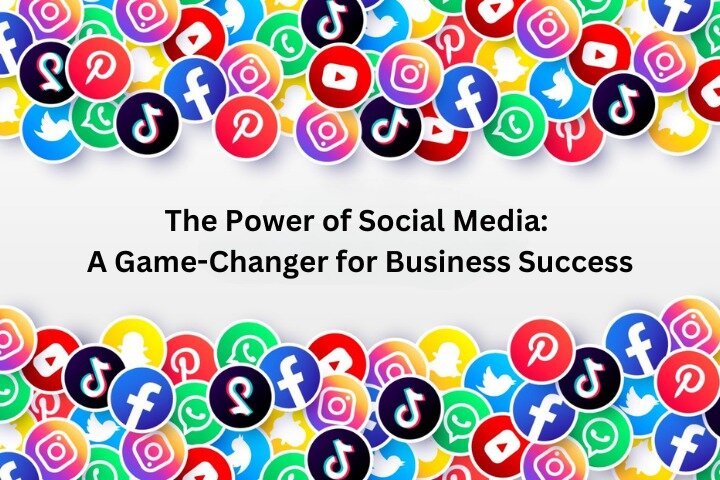
Thanks to the digital age, the world has become “social.”
Social media attracts more and more people into its fold, opening the doors for businesses to profit from it. In this exciting digital age, where connectivity drives consumer behavior, social media has become a vital tool for businesses to carve their niche.
A strong social media presence is no longer just an option for any business – it’s essential for its survival and growth. Whether you’re a startup finding your feet or an established SME looking to expand your reach, Social Media could be your trusted friend in building your brand and connecting with customers.
Understanding Social Media & Its Core Components
Social Media refers to online platforms that allow users to create, share, and interact with content. Though Social Media was developed for sharing personal updates, It’s not just that anymore – it has evolved into a powerful business tool for communication and marketing.
Among the primary components that make social media interesting are:
1. Content Creation: Businesses can create posts, videos, images, and more, to engage their audience.
2. Engagement: Liking, sharing, commenting, and interacting with followers is essential to foster relationships.
3. Analytics: Platforms provide valuable insights into user behavior, helping businesses measure the success of their campaigns.
4. Advertising: Paid social media ads allow businesses to target specific audiences with precision.
The Critical Role of Social Media in Today’s Business Landscape
Why are Social Media important for businesses today?
1. Unprecedented Reach: With billions of active users worldwide, social media provides unparalleled access to potential customers.
2. Cost-effective Marketing: Unlike traditional forms of marketing, social media allows even small businesses with limited budgets to promote their business and reach their target audience.
3. Real-Time Customer Engagement: Direct customer interaction helps build stronger relationships and gather immediate feedback. Queries can be answered, issues resolved, and new updates shared in minutes.
4. Brand Awareness & Recognition: A consistent social media presence increases brand visibility, making it easier for customers to recognize and remember your brand.
5. Boosting Website Traffic: Social media channels can effectively direct traffic to your business website, supporting growth through online conversions.
6. Data-Driven Decision-Making: Social media platforms provide valuable insights into customer behavior and preferences.
Positive & Negative Impact of Social Media on Branding
Social media plays a dual role in shaping a brand’s image, offering both opportunities and challenges.
Positive Impact:
1. Enhanced Customer Engagement: Direct interactions with customers humanize your brand and help create trust.
2. Viral Marketing Potential: If your content resonates, it can be shared rapidly, exponentially increasing brand exposure.
3. Targeted Advertising: With robust targeting options, social media allows businesses to connect with audiences based on location, interests, behavior, and more.
Negative Impact:
1. Damage to Brand Reputation: Negative feedback or reviews, if not managed properly, can tarnish a brand’s image in a matter of hours.
2. Time & Resource Intensive: Maintaining a consistent and effective social media presence requires ongoing effort and strategy.
3. Misinformation & Trolls: In an unregulated space, misinformation and negative comments can spread, which may require careful management.
Recommended Social Media Platforms for Business Growth
1. LinkedIn
Perfect for B2B networking
Professional audience
Thought leadership opportunities
Industry insights and news sharing
2. Instagram
Visual storytelling
Product showcasing
Behind-the-scenes content
Young, engaged audience
3. Facebook
Wide demographic reach
Detailed targeting options
Community building
Comprehensive analytics
4. Twitter
Real-time updates
Industry conversations
Customer service
News sharing
5. YouTube
Educational content
Product demonstrations
Brand storytelling
Long-form content
Best Practices for Social Media Success
In a digitally competitive social landscape, outstanding social media maintenance is a non-negotiable. Here are a few social media marketing best practices:
● Create a Clear Strategy
Define your goals
Identify target audience
Plan content calendar
Set measurable KPIs
● Maintain Consistency
Regular posting schedule
Consistent brand voice
Unified visual identity
Quick response times
● Engage Authentically
Respond to comments
Join conversations
Share user-generated content
Build genuine relationships
In a nutshell:

Social Media has become an indispensable tool for business growth in the digital age. Businesses need a well-defined strategy and ongoing effort to stay relevant and competitive in a crowded online space.
For SMEs and startups, Social Media offers a level playing field to compete, build a strong brand presence, and connect with customers meaningfully. Success lies in choosing the right platforms, creating valuable content, and maintaining consistent engagement with your audience.
By leveraging social media wisely, SMEs and startups can unlock incredible growth opportunities while building a loyal and engaged customer base.
Common FAQs on Social Media for Business Growth
Q. Why should SMEs invest in social media?
Ans: Social media offers SMEs a cost-effective way to reach a large audience, engage with customers, and build a brand presence without requiring a huge marketing budget.
Q: How often should my business post on social media?
Ans: The frequency depends on your platform and audience, but aim for 3-5 times per week on primary platforms and at least weekly on secondary platforms.
Q: Which social media platform is best for my business?
Ans: It depends on the nature of the business. Choose platforms where your target audience is most active. B2B companies often succeed on LinkedIn, while consumer brands might focus on Instagram or Facebook.
Q. Can social media help generate leads for my business?
Ans: Absolutely. Social media platforms offer targeted advertising, content marketing, and direct customer engagement. Done professionally, all of this can assist in driving lead generation.
Q: How can I measure social media ROI?
Ans: Track metrics like engagement rates, website traffic from social media, lead generation, conversion rates, and customer acquisition costs.
Q. How can negative feedback on social media affect my business?
Ans: Negative feedback can harm your brand’s reputation, but if managed properly, it also provides an opportunity to show excellent customer service and turn detractors into loyal customers.
Q: Should I use paid social media advertising?
Ans: Once again, it depends on your long-term and short-term business goals. While organic growth is important, strategic paid advertising can significantly boost your reach and target specific audiences more effectively.
How Can LUMOS Web Support Assist
At LUMOS Web Support (LUMOS), we understand the challenges of managing an online presence. We offer holistic solutions that go beyond just website maintenance.
Our services include Social Media Integration, content optimization, and Online Branding for Startups and SMEs, ensuring your brand stands out. We help you harness the power of social media for business growth by crafting strategies that align with your business goals.
We, at LUMOS, partner in transforming your online presence into a business success story. Let’s grow your business with social media today!

